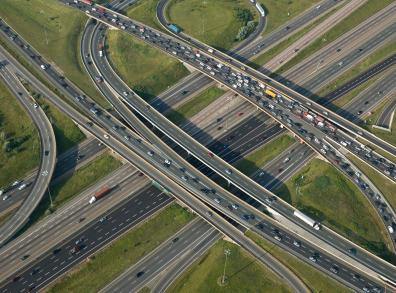With less than 15 legislative days until Congress embarks on a month-long recess, the House and Senate separately took initial steps last week toward replenishing the Highway Trust Fund before it runs out of money on August 1. While there is bipartisan support for the Fund itself, the process of replenishing it has grown increasingly controversial in recent years.
Established in 1956, the Highway Trust Fund finances the Interstate Highway System. Its primary source of funding, stemming from 18.4 cents per gallon gas tax, is not indexed for inflation; producing declining revenue over the years as vehicle fuel efficiencies have increased and fewer drivers are on the road.
Less dedicated money coming in, means Congress must get creative to bridge the gap. Often times, Members suggest radical ideas, such as targeting specific industries for tax increases or using other money in the budget.
Politically driven stunts of this nature do not advance the debate and actually distract from the problem at hand. Fortunately, this year’s debate appears focused on better approaches.
One proposed fix – both long and short term – is biting the political bullet and increasing the gas tax for both unleaded and diesel fuel by six cents, and tying future increases in the gas tax to inflation. This concept, proposed by Senators Chris Murphy and Bob Corker, would take great strides to stabilize the fund, and provide long-term funding solutions. Increasing the gas tax in an election year – or any year – is never easy business, and current Congressional action on both sides of the Hill reflects this fact.
It is not likely either the bipartisan plans of the House Ways and Means Committee and Senate Finance Committees will be the final solution – it, however, has started the process. While questions of duration will likely make this bicameral process a major challenge – the assumption is, regardless of the political posturing which will take place, some short term revenue solution will be agreed upon prior to the pending shortfall in funds.
In a city where it is difficult to find bipartisan solutions, no one in the Capitol wants the Fund to be empty, which would halt hundreds of projects around the nation and force 700,000 workers out of their jobs. It would be wise to spend time in the upcoming months creating a long-term independent funding source to avoid these last minute fixes in the future.
In the present, prior to the election, the best we can hope for may be a smooth and uneventful compromise aimed at providing a short term solution to the coming revenue shortfall – a process which avoids partisan sniping and campaign talking points. Even after the short term need is addressed, it is vital lawmakers make the most of the time they buy themselves, engaging in real debate of how to fix the problem on a long term basis.
Our infrastructure is simply too important to let this issue fall off the top of the legislative agenda.
See the original article at Forbes.






